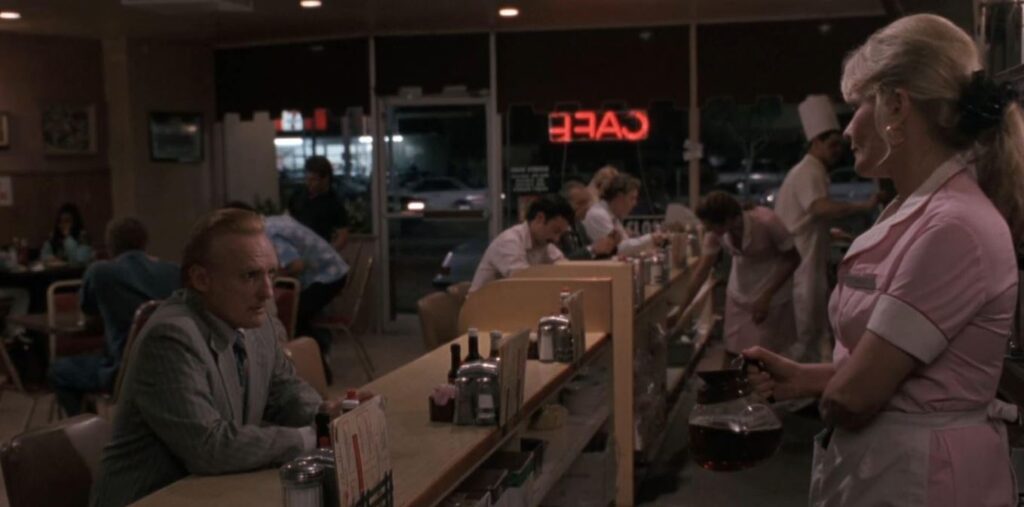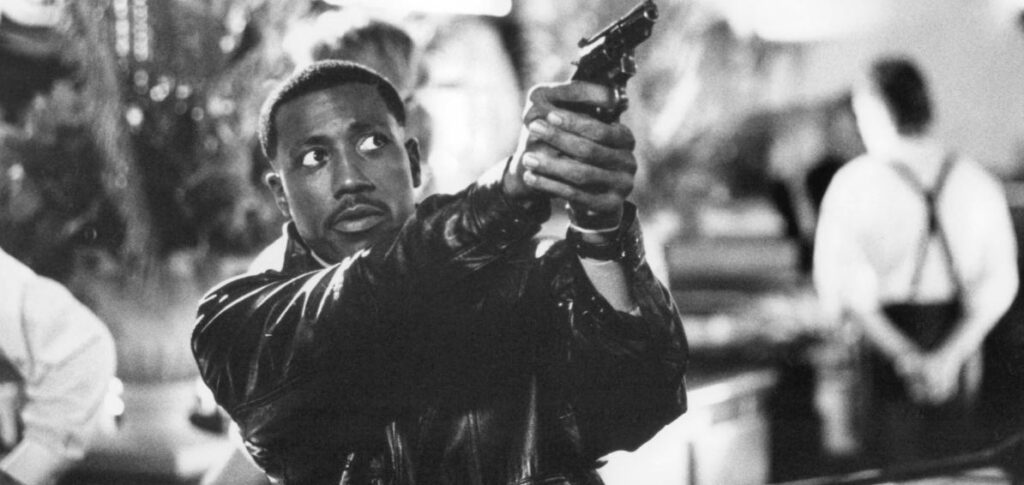
Johnny Mercer’s song Dream is the theme to James B. Harris film Boiling Point. It could not be more appropriate.
Dream, When you’re feelin’ blue
Dream, That’s the thing to do
Just watch the smoke rings rise in the air
You’ll find your share, Of memories there…
Written & Directed by James B. Harris and based on Money Men by Gerald Petievich, T-Man (Ret.)
With: Wesley Snipes as US Treasury Agent Jimmy Mercer, Dennis Hopper as Rudolph “Red” Diamond a conman and counterfeiter. Lolita Davidovich as Vikki Dunbar, a high-priced hooker. Mercer’s girlfriend. Viggo Mortensen as Ronnie, a remorseless killer for Red.
Dan Hedaya as US Treasury Agent Sam Brady, Seymour Cassel as Virgil Leach,
Jonathan Banks as Max Waxman, corrupt lawyer, also seen in To Live and Die in LA
Christine Elise as Carol, Ronnie’s girl, Tony Lo Bianco as Tony Dio, mob boss holding Red’s marker, Valerie Perrine as Mona, Red’s long-suffering girlfriend and a dreamer herself.

Agent Jimmy Mercer, a divorced father, dreams of a closer relationship with his son. His girlfriend Vikki gave-up on dreams long ago. Red Diamond dreams of one last big score and a life with Mona, who knows dreams seldom come true. Red’s gunsel Ronnie? Who knows what a homicidal sociopath dreams of?
Mercer and Red are linked by two elements: the crimes Red commits and Mercer’s compulsion to arrest him; and Vikki. Mercer takes her to bed, and Red takes her dancing to the old songs at the Hollywood Palace. People there really dance.

Hollywood is, after all, the dream factory.
Boiling Point is a gritty police procedural. The cop is as obsessed as the crook is desperate. Death isn’t in slow motion but quick and final. Harris’ camera does not shy away, but neither does it dwell on a bloody corpse. He is adept at intercutting three dramatic parallel scenes involving the personal relationships of the main characters.
The good guys win, at the Hollywood Palace, where different dreams come true. James Harris was Stanley Kubrick’s partner in all his early films including The Killing, Paths of Glory, and Lolita. He did some work on the Dr. Strangelove screenplay but left to direct the Cold War thriller The Bedford Incident. It was a good film dealing with nuclear brinksmanship. It was followed a decade later by Some Call it Loving, a little weird for my taste, but what do you expect from a John Collier story? Then the noir thriller Cop, based on Blood on the Moon, by James Ellroy, with an intense performance by James Wood.

Harris dealt with studio interference with Boiling Point. The attorneys, accounts and other assorted grifters who are in charge of Hollywood have the film sense of the deaf dumb and blind. The “entertainment press” which includes critics and television reviewers, have chosen to award Kubrick cinematic sainthood, even rationalizing snooze-fests like Barry Lyndon and the final bizarre, Eye’s Wide Shut.
When Kubrick died at a far too young age, the Hollywood press rushed to Steven Spielberg for a comment, ignoring his friend and former partner. James B. Harris don’t get no respect. In a world that elevates Bob Dylan to the status of William Butler Yeats and T. S. Eliot, I suppose I should not be surprised. I can dream about it. Who has the best PR, wins.
Leave a Reply